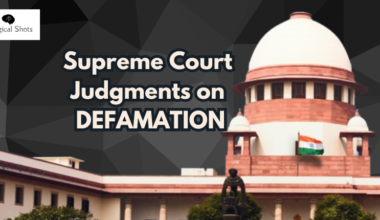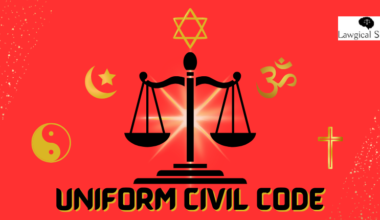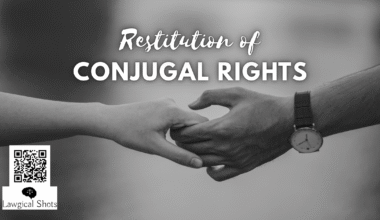Before starting anything about what Advocate Anam Siddiqui said, you should know about this family story I recently heard about. It’s a family of four – two sons and their parents. The elder son met this girl in an arranged marriage set-up, which means a couple of meetings and things are fixed. During the unofficial Roka when there were only the bride and groom’s immediate family members present, something unexpected happened. The bride’s side presented a briefcase containing a cash amount of Rs 10 lakhs, clicked a photograph, and when the groom’s side objected to taking any such amount, they took back the briefcase. The two got married, the wife never stayed with the in-laws because she didn’t want to, and the husband somehow managed to keep the marriage. When his younger brother asked him why he was compromising in such a marriage, he reminded him of the image of a briefcase with 10 lakh cash, and its potential to attract misuse of laws for married women by his wife.
I don’t know what you as a reader may be thinking, but this blew my mind. I used to think that the misuse only used to start when the marriage would go wrong. I didn’t know that the planning had begun to sprout at the early stages as well. But this also shot me in the other direction, since some women and their families are so proactive in laying the trap, what should men do to safeguard their interests? With all this in mind, I (Ridhi Khurana) bombarded Advocate Anam Siddiqui with a pile of doubts, which she addressed and offered feasible solutions, a need of the hour. Catch up with Advocate Anam’s suggestions spread across the various stages of marriage, for men to protect themselves and their families against women misusing laws.
How Men Can Protect against Misuse of Laws by Wives
Q- What can be the approach to safeguard legal interests of men and their families, before marriage?
Advocate Anam Siddiqui dealt with the pre-phase, when the couple is yet to tie the knot, while the marriage is still under discussion or being planned.
1. Prenuptial Agreements
Prenuptial agreements in India are the agreements entered into before marriage, which contemplate the separation of assets of partners, in case they decide to part ways in the future, may be a few years after marriage. Prenups are a way of showing trust for couples, where the financial dynamic tilts heavily on one of the partners, and the other wishes to show that he/she has no interest in the other’s money.
The concept of Prenuptial Agreement is prevalent in some countries like the USA, Canada, etc. In India, these agreements have little to no legal sanctity, as the Indian Contract Act, 1872 does not consider such agreements to be legally enforceable. Since, prenuptial agreements are not enforceable in India, the parties cannot approach the courts to enforce it, and thus, it is an exercise in futility.
2. Family Investigation
To enquire and investigate into the family one is going to marry into, may seem a bit intruding, but is all the more needed in these trying times. The purpose is to verify the credentials, financial stability and social standing of the prospective partner, as many people project a false image before marrying, which may just completely destroy the partner’s life, if a background check is not done.
Though ethically, it may be a grey area, it is required as many people fail to mention, if they had been involved in any past criminal behaviour, if they have any debt. Since arranged marriages are common in India, these background checks are necessary as the couple would not have known each other for long.
3. Affidavit of Gifts
Whenever a marriage goes bad, the allegations of dowry demands come from the wife’s side, regardless of nothing was demanded or even given at the time of marriage. To avoid that, parties can sign an affidavit of gifts depicting the expenses of both sides. It is advisable for the bride and groom’s side to divide in half all the expenditures of marriage. When we say NO TO DOWRY, it is equally wrong to give dowry and punishable as well. People don’t usually talk about that aspect, but when allegations of dowry are made, giving dowry is also punishable. So, it’s better to sign an affidavit depicting the exchange of gifts from both sides.
4. Transfer of Properties
Many people prefer to transfer their assets to their mother’s name or father’s name. In this way, the property cannot be divided for alimony, in case there is a divorce, as these properties already have been transferred to someone else. These transfers are done without consideration, and once the property is transferred, the gift deed cannot be revoked or cancelled. The registration of a gift document creates a presumption in favour of the gift deed, so the recipient of the gift should be a trustworthy person, as these properties would essentially belong to them now.
Q- What can be the precautions during married life, from a legal perspective?
Advocate Anam Siddiqui – During married life, few precautions to be taken are that both partners should be understanding to each other, communicate towards the needs of the other. It goes without saying, but one should not be subjecting their partner to cruelty, one should not be over intruding, one should give their spouse some space, one should not be hitting their spouse. These precautions need to be taken from both partners, for a healthy marriage. And people should remember that litigation ought to be the last resort.
It should be noted that if things reach the Court, you prove your case through evidence, whether it is call records, chat screenshots, etc. Keeping those with you may help legally in case marriage goes wrong.
Q- What should be the steps if things go wrong in a marriage?
Advocate Anam Siddiqui – If things go wrong, one should contact a lawyer immediately, and try to keep one’s and one’s family’s name clear. If the wife has filed an FIR, though the Police should not arrest in these matrimonial disputes, it is well advised to consult a lawyer and be ready with what to say and not to say before the Police.
It is also advised to keep friendly relations with neighbours and family friends/relatives, as they may later be called to testify in a Court.
D. What should be the legal approach if the couple decides to part ways?
Advocate Anam Siddiqui – There are multiple options if the couple decides to part ways. The couple can get a mutual divorce, in case both parties wish to be separated amicably and on friendly terms. They can even openly discuss their terms of settlement, amount of maintenance required, custody rights in case of children, visitation rights, all can be discussed and be reduced to an agreement which will be enforceable by law.
In case mutual divorce is not an option, one of the parties has to file for a divorce, and has to prove why the other spouse has indulged in such behaviour which warrants a divorce. In other words, they need to prove one or more of the grounds for divorce and convince the Court.
The Courts also try to preserve the sanctity of marriage and try if a couple with marital problems can be brought together through counselling.
Inference
While it should not be forgotten that marriage is a sacrament. However, it is upon both man and wife to respect the bond of love and marriage. If everything seems to be falling apart for one, while the other remains inconsiderate, marriage becomes one-sided. Hence, taking care of one’s own interests would not be wrong, since nobody is harmed. It is just an attempt to avoid future troubles, since the laws in India sadly believe word of women, and test even the concrete evidence produced by men.








